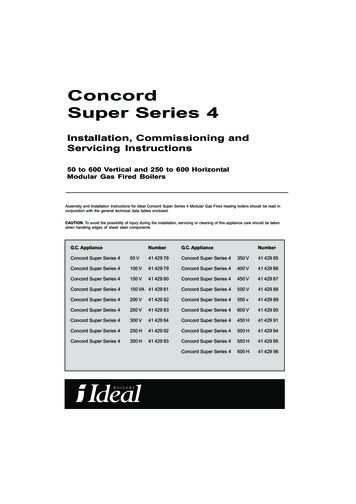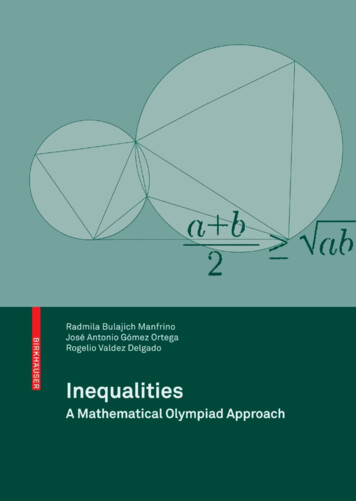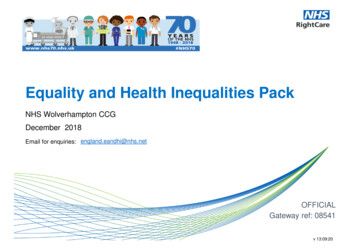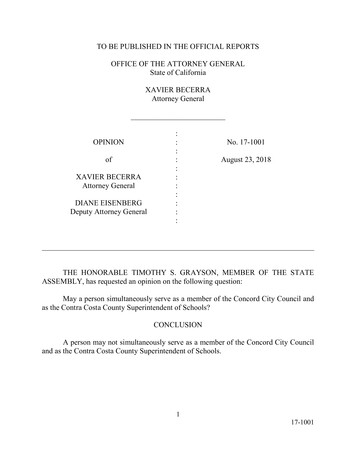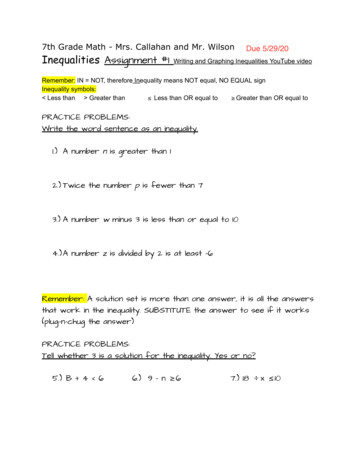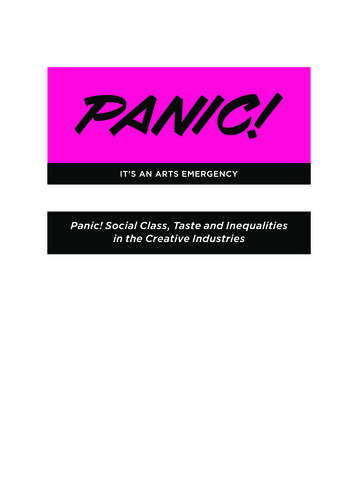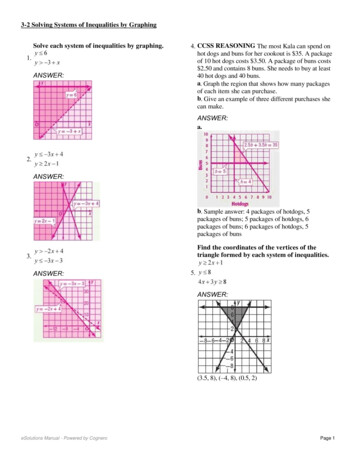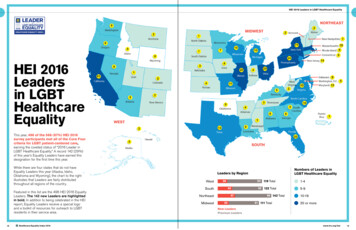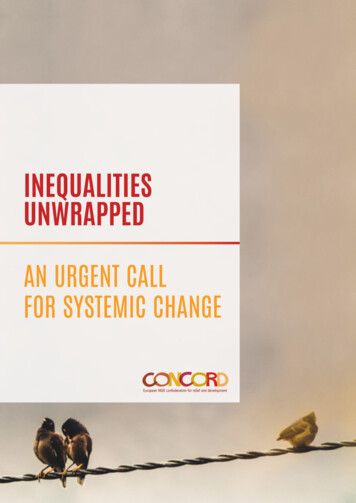
Transcription
INEQUALITIESUNWRAPPEDAN URGENT CALLFOR SYSTEMIC CHANGE1Inequalities unwrapped - An urgent call for systemic change
ABOUT CONCORDCONCORD is the European NGO Confederation for Relief and Development.Our members are:28National Platforms25Networks04Associate Memberswhich represent over 2,600 NGOs supported by millions of citizens all around Europe. Our confederation bringsdevelopment NGOs together to strengthen their political impact at the European and global levels. United, weadvocate for Europe-wide policies to promote sustainable economic, environmental and social developmentbased on human rights, justice and gender equality. We also work with regional and global civil society allies toensure that EU policies are coherent in promoting sustainable development in partner countries.More at: concordeurope.orgABOUT THIS REPORTAs CONCORD is going through its 2016–2022 Strategy mid-term review process, it has become clear that reducinginequalities will become a priority for CONCORD over the coming years. This report aims to provide a learning piecefor CONCORD’s membership and for the wider development community on the subject of inequalities and thesystemic changes needed to address them. With this report, CONCORD also wants to offer concrete proposals forEU decision-makers to respond to this soaring worldwide, man-made problem.ACKNOWLEDGEMENTSAuthor: Lonne Poissonnier (CONCORD Europe), with valuable contributions from Sofia Svarfvar (CONCORDSweden), Karin Sohet (Act Alliance EU), Marie Tempesta (IPPF European Network), Evert-Jan Brouwer (EU-CORD),Inge Brees (CARE International), Cristina Iova (FOND Romania), Sami Asali and Sophie Duval (Coordination SUD),Isabelle Brachet (ActionAid International), Alissa Ghils Mendoza (SOLIDAR), Francois Carbonez (Light for theWorld), Chiara Putaturo (Oxfam International), Rebekka Blomqvist and Tanya Cox (CONCORD Europe) and othercolleagues from CONCORD’s inequalities work stream.Coordinator: Lonne Poissonnier (CONCORD Europe)Copy-editor: Jen ClaydonDesign: www.profigrafik.sk – coordinated by Hélène Debaisieux (CONCORD Europe)Publisher: CONCORD Europe – Rue de l’industrie 10 – 1000 Brussels, BelgiumYear of publication: 2019Cover image from Abhishek Gaurav on Stocksnap.ioIllustrations on inequalities from Benjamin Mutombo (Goum)The positions adopted in this paper are those of CONCORD Europe.2Inequalities unwrapped - An urgent call for systemic change
TABLE OF CONTENTSEXECUTIVE SUMMARYIINTRODUCTION1UNDERSTANDING INEQUALITIES2ECONOMIC INEQUALITY3SOCIAL INEQUALITY6POLITICAL INEQUALITY8CLIMATE AND ENVIRONMENTAL INEQUALITYRESPONSES TO GROWING INEQUALITIES1011TRANSFORM THE ECONOMIC, FINANCIAL, POLITICAL AND SOCIAL SYSTEMSEconomic systemFinancial systemPolitical systemSocial system1212151617REDISTRIBUTE INCOME, WEALTH AND RESOURCES FAIRLYTaxPublic servicesClimate financeAid1818181919MONITOR AND DECIDE ON THE BASIS OF WELL-BEING OF ALL PEOPLE AND THE PLANET20CONCLUSION21
EXECUTIVE SUMMARYCredit: Photo by Sergio Souza on UnsplashInequalities, relentlessly on the rise across the globein various forms, are no accidents of fate. They arethe result of specific actions and policy choicesby people in power. And it is high time to turn thetide. World leaders have committed to universallytackle inequalities by adopting the 2030 Agendafor Sustainable Development and the incoming EUleadership has pledged to support this effort at homeand abroad. CONCORD would thereby like to increasethe common understanding of this multidimensionalconcept and put forward concrete proposals for howto translate the promises into action.continues to increase, both in terms of wealth andincome. Socially constructed norms continue toprivilege one group over others, including aroundaccess to social rights and services, with grounds ofdiscrimination that can overlap. People and countriesacross the globe have unequal access to politicaldecision-making, often resulting in discriminatorylaws, symbols or policies and shrinking civil societyspace. And the consequences of climate change,resources to prepare for and recover from themand access to natural resources are also not evenlydistributed across the globe.Reducing inequalities worldwide, both within andbetween countries, is a complex issue that demandsa systemic approach. It cannot be tackled in siloes.It requires an integrated approach that looks beyondtraditional development cooperation to address theother EU and Member States’ policies that have asignificant impact on partner countries. An approachthat dares to look critically at the underlying systemsthat generate inequalities. This is why CONCORDlooks not only at what the EU and its MemberStates can do to support partner countries to reduceinequalities, but also at other external and domesticpolicies because they impact on or could inspire ordiscourage efforts of partner countries.To sustainably tackle these various forms of inequalitiesworldwide, decision-makers should 1) rebuildeconomic, financial, political and social systems sothey no longer create such inequalities, and 2) reduceexcessive inequalities in our world today with the helpof redistributive policies. The EU and its Member Statesshould do this for people at home. They should makesure none of their policies negatively affect inequalitiesabroad and ensure the new flagship initiatives underthe EU’s Political Guidelines 2019–2024 positivelycontribute to reducing inequalities worldwide. Andthey should support partner countries in tacklinginequalities through international cooperation andpartnerships. The following calls are not CONCORD’slast words on this matter, but proposals to kick off thethinking on how the EU and its Member States canreduce inequalities for current and future generations,wherever they live.Inequalities come in different shapes and canstrengthen one another. Economically, the differencebetween the richest and poorest people and countriesIInequalities unwrapped - An urgent call for systemic change
CONCORD CALLS ON THE EU AND ITS MEMBER STATES TO:1TRANSFORMTHE ECONOMICSYSTEMa. Strengthen social dialogue and insist on decentworking conditions being applied, including livingwages, social protection and respect for rights anddemocracy at work across global value chains.b. Support well-designed human rights and lifecycle-based, gender-sensitive universal socialprotection systems in partner countries.c. Support the creation of a regulatory environmentthat encourages enterprises to combine circulareconomy business models with social solidarityeconomy principles worldwide and tailor tradeagreements and investment programmesaccordingly.d. Adopt effective EU legislation that establishes amandatory human rights and environmental duediligence framework for businesses, companiesand financial institutions; support the UN Treatyon Multinational Corporations and Other BusinessEnterprises with Respect to Human Rights; andterminate the investor-state dispute settlementmechanism.e. Prevent economic policies or regulations causingnegative spillover effects and contributing toincreasing inequalities in other parts of the world.2TRANSFORMTHE FINANCIALSYSTEMa. Strengthen and expand EU law requiring largecompanies to disclose certain information on thesocial and environmental impacts of their activitiesworldwide (non-financial reporting).b. Continue to support the International Platformon Sustainable Finance but also take social andgovernance dimensions of sustainability intoaccount.c. Create the right regulatory context to facilitatesustainable banking and support member-ownedand people-oriented financial cooperatives.3TRANSFORMTHE POLITICALSYSTEMa. Set up and promote more transparent, accountable,inclusive and participatory governance processesat local, national, regional and international level –with the active involvement of civil society – andadopt inclusive policies.b. Empower people and civil society by strengtheningcivic education, global citizenship educationand supporting civil society organisations,grassroots women’s rights movements, workers’organisations and trade unions, cooperatives,independent media, whistle-blowers and others,in the EU and partner countries, while avoidingcorporate capture of political power.c. Make the global governance system moreinclusive of developing countries and genuinelybuild international partnerships of equals.4TRANSFORMTHE SOCIALSYSTEMa. Invest in tackling discrimination and promotingdialogue.b. Ensure and support universal access to publicservices and good social protection for all, investin human development through developmentcooperation programmes.Inequalities unwrapped - An urgent call for systemic changeII
c. Address gender inequality in areas such asaccess to sexual and reproductive healthservices and rights, inclusive education, decentwork and full participation in society.d. Stimulate a dialogue between women andmen, boys and girls, as well as community andreligious leaders and other figures of authorityand invest in gender education, while focusingon discriminatory legislation.e. Fully implement and strengthen the EU’s externalGender Action Plan 2016–2020 and ensure thatall policies – including their trade, investmentand debt policies – positively contribute to anddo not undermine these efforts.5d. Reach the agreed targets of 0.7% of GNI forofficial development assistance (ODA) and0.2% of GNI to least developed countries andensure the Neighbourhood, Development andInternational Cooperation Instrument supportsgender equality, climate action and humandevelopment and does not increase inequalities.6a. Replace GDP as the dominant indicator ofprogress with genuine measures of the actualwell-being of people and planet, harmonisethese at EU level, integrate them in a SustainableEurope 2030 Strategy, replace the Stability andGrowth Pact with a Sustainability and Well-beingPact and implement the new strategy and pactthrough the renewed European Semester policycoordination cycle, to inspire planning andbudgeting across the EU.REDISTRIBUTE INCOME,WEALTH AND RESOURCESFAIRLYa. Set up and promote progressive tax systems,increase aid spending on progressive domesticresource mobilisation, consolidate a commoncorporate tax base, ensure greater taxtransparency, set up a global tax body, explorethe possibility of setting up a global wealth taxand introduce a financial transaction tax.b. Invest in collecting data disaggregated byincome, gender, age, race, ethnicity, migratorystatus, disability and geographic location and inequality data, start using new data sources suchas citizen-generated and big data and buildingmodels in real time and support data collectionby partner countries.b. Support partner countries’ national budgetallocations for public services to avoid cutsdue to trade liberalisation, public debt or otherpolicies and stop incentivising the privatisationand commercialisation of essential publicservices; provide budget support and technicalassistance to assist partner countries in buildinggender-responsive public services accessible forall; use their role and leverage in internationalfinancial institutions to oppose providing loanswith conditionalities that affect human rights andgender equality.c. Look more thoroughly and consistently atthe impact of policy or legislative options oninequalities and human rights, both within theEU and in partner countries, when conductingex-ante impact assessments to inform decisionmaking.d. Implement the recommendations of theCommission Staff Working Document onaddressing inequalities in partner countries tostrengthen EU policies to address inequalities, tobetter mainstream the reduction of inequalitiesin the EU programme and project cycle, andto strengthen partnerships for addressinginequalities as well as data and knowledge.c. Ensure climate finance to developing countriesfor adaptation and mitigation as well as loss anddamage.IIIInequalities unwrapped - An urgent call for systemic changeMONITOR AND DECIDE ON THE BASISOF WELL-BEING OF ALL PEOPLEAND THE PLANET
INTRODUCTIONInequalities are not accidents of fate – they are theresult of deliberate actions and policy choices bypeople in power in the social, economic and politicalspheres. Today, billions of people are facing deplorableinequalities of opportunities, choices, resources,security and protection, freedom and power. Currentlevels of inequalities – both between people andcountries – reflect a system in which something isvery wrong.Leaders of 193 UN Member States committed tochange this in 2015 when they adopted the 2030Agenda for Sustainable Development,1 built around 17strong pledges: the Sustainable Development Goals(SDGs).2 The 2030 Agenda includes a specific butcrosscutting goal to tackle inequalities between andwithin countries and ensure non-discrimination (SDG10). This is complemented by a goal dedicated togender equality (SDG 5) and targets in other goal areaswhich address inequality. With the 2030 Agenda, allcountries also unanimously adopted the powerfulprinciple of ‘leave no one behind’. This requires allstakeholders to address all forms of discrimination,exclusion and inequality and to prioritise the peoplefurthest behind first. With their 2019 SDG Summitpolitical declaration ‘Gearing up for a decade of actionand delivery for sustainable development’, heads ofstate and government reaffirm their commitmentto tackle rising inequalities within and betweencountries.3The link between tackling inequalities and reachingthe people furthest behind first is crucial. As noted bythe UN Special Rapporteur on extreme poverty andhuman rights in 2015, “Extreme poverty is directlyrelated to extreme inequality, especially, but notonly, in relation to wealth and income distributionwithin countries”.4 Extreme inequality around theworld has negative effects on realising people’scivil, political, economic, social and cultural rights.Widening economic and social inequalities are “oneof the reasons why over one quarter of humanitycannot properly enjoy human rights”.5 In 2019 theUN Special Rapporteur also pointed to the risk thatclimate change poses for increasing inequalities evenfurther, “We risk a ‘climate apartheid’ scenario wherethe wealthy pay to escape overheating, hunger, andconflict while the rest of the world is left to suffer”.6At EU level, European Commission President UrsulaVon der Leyen, in her political priorities for 2019 to2024, made it a top priority to develop an economythat works for people, built on equality for all andin all of its senses. Too many people feel they havefewer opportunities than others and the EU needsto use all the tools at its disposal to put this right.7In the field of external action, as the world’s biggestdonor of development assistance, it sets out to createa partnership of equals with its neighbouring andpartner countries. But it remains unclear as to how theincoming Commissioner for International Partnershipsand the High Representative Vice-President are towork towards reduced inequalities worldwide. In2017, the EU and its Member States adopted theEuropean Consensus on Development in which theypromised to address inequalities to ensure no oneis left behind. In 2019, the Commission published aStaff Working Document with concrete proposals toaddress such inequalities in partner countries.8 Overthe coming years, the EU will have to live up to thesecommitments and take concrete actions to tacklerising inequalities.However, reducing inequalities both within andbetween countries is a complex issue that demandsa multidimensional and systemic approach. In thispaper, CONCORD dives into different forms ofinequality and solutions to tackle it, to give an insightinto some of the most pressing matters that the EU,its Member States and the international communityshould be addressing to tackle the current state ofinequality.Inequalities unwrapped - An urgent call for systemic change1
UNDERSTANDING INEQUALITIESAn understanding of the various dimensions ofinequalities and what drives them is needed to identifythe most appropriate and sustainable solutions forthis complex and global challenge. Inequalities do notonly concern economic inequality, such as incomeand wealth, but are present in every aspect of societyand may touch on every part of a person’s life. Thedrivers are often anchored in the norms and culture,policies, power relations, structures and systems onwhich societies have been built.In this section inequalities are looked at throughthe four dimensions of sustainable development:economic, social, political (or governance) andenvironmental. This is not an exhaustive description,but it illustrates the complexity and interlinkagesbetween different forms of inequalities.BOX 1: GENDER EQUALITYGender inequality is an intrinsic componentof inequalities. Whether talking about wealth,income, work, decision-making, place insociety, social norms, unpaid care work oraccess to resources (including land rights orfunding for climate change adaptation) andessential services, gender has a tremendousimpact. Gender inequality is structuraldue to a patriarchal system which leaveswomen and girls often unprotected andexcluded by legislation and behaviour. Evenwhere legislation promotes gender equality,implementation often lags behind due to alack of awareness, patriarchal social norms2Inequalities unwrapped - An urgent call for systemic changeand/or a lack of resources to implement andenforce the policy. The result is that womenand girls systematically face discrimination inaccessing their rights and are often exposedto violent and abusive behaviour. This callsfor attention to focus on gender equalitywhen working to reduce inequalities. Whilealmost every woman and girl is affected by thepatriarchal system, some are more affectedthan others and left further behind in terms ofbeing able to claim and enjoy their rights (inparticular women and girls who face multiplediscriminations).9
ECONOMIC INEQUALITYOur current dominant economic system – basedon a concentration of private ownership, inadequatelyregulated financial and capital markets, competition ina so-called free market and the pursuit of short-termprofit, with only a small role for the state – has led toa huge increase in economic, environmental and socialchallenges. It has led to a society in which wealth isaccumulated in the hands of a few, while middle classesare struggling to maintain their incomes and people livingbelow the poverty line are left behind. It is a system thathas led to a drop in taxes for the richest individuals andbig corporations, with a disproportionate tax burden onworking people, deregulation, privatisation and a cutin public services.10 All these factors have increasedeconomic inequality. It is the basis of a system in whichGDP growth is considered a more important indicatorof progress than the well-being of society, the numberof people living in poverty or the growing inequalitiesbetween people.Economic inequalities are enormous and rising.At global level, the economic distance betweenthe richest and poorest people in the world isextreme. This is due both to inequalities in income(from labour or capital) and wealth (the ownershipof assets). According to Oxfam International, thenumber of billionaires globally has almost doubledsince the financial crisis in 2008. In 2018, 26people owned the same wealth as the 3.8 billionpeople who make up the poorest half of humanity,down from 43 people the year before. The wealthof the world’s billionaires increased by 900 billionbetween 2017 and 2018 alone, or 2.5 billion a day.Meanwhile the wealth of the poorest half of humanityfell by 11%. So the distance between people isonly increasing. The World Inequality Report 2018shows that between 1980 and 2016, the richest 1%received 27 cents of every dollar of global incomegrowth, with the poorest 50% of people receivingonly 12 cents of every dollar.11 Today, Africa is hometo 20 billionaires, living alongside 413 million peoplein extreme poverty and if current economic trendscontinue, 87% of poor people worldwide will beconcentrated in sub-Saharan Africa by 2030.12At national level, the World Inequality Report2018 shows that in almost all countries the incomedifference between people within a country hasInequalities unwrapped - An urgent call for systemic change3
increased since the 1980s.13 However, the reportconcludes that given the different speeds of therise in inequality, institutions and policies matterin shaping inequality.14 Economic inequality is oneof the inequalities that can be changed throughpolicies. But this means changing an economicparadigm that informs many aspects of the designof today’s society. We must nonetheless urgentlytake action, as in the meantime, the consequencesof such rising inequalities will grow, especially sinceeconomic inequality touches on and interacts withalmost every other form of inequality.A major reason for the highly unequal distributionof wealth is the way our economic systemprioritises returns to shareholders over everythingelse. Evidence shows that inequality is built intoour economic system. A significant share oftoday’s inequality is due to the inequality ofincome people earn through labour. Today,work or labour is structured in ways that benefitthose at the top far more than those in the middleor at the bottom, and wages at the top have risendisproportionately to productivity.15 However, theaccumulation of wealth is playing an increasingrole in the economic inequality between people. AsThomas Piketty argues, given economic prospects,wealth will accumulate much more rapidlyfrom capital than from labour, leading to a rapidconcentration of wealth in the hands of a few.16Automation and the digital divide might deepeninequalities, creating a gulf between the expertlyskilled people who will be able to contribute tosociety in meaningful ways and the less skilled whorisk being sidelined.17The increasing gap between rich and poor peoplealso fuels the economic gap between women andmen. Most of the world’s richest people are men.According to the International Labour Organization(ILO), globally women continue to be paid around20% less than men.18 The economic distancebetween men and women is not surprising giventhat men are more likely to own land and productionassets, which are essential resources to economicgain in today’s society.194Inequalities unwrapped - An urgent call for systemic changeTaxation plays an important role in tackling economicinequalities. But in many cases taxes are becomingless progressive and even regressive. For everydollar of tax revenue, on average just 4 cents are madeup of revenue from wealth taxes, like inheritance orcapital gains tax. In rich countries, the average toptax rate on personal income fell from 62% in 1970 to38% in 2013.20 In developing countries, the averagetop rate of personal income tax is 28%.21 There arealso compelling figures on declining corporate incometax rates.22 Moreover, many super-rich peopleand corporations hide large amounts of resourcesoffshore, in tax havens, using loopholes in regulationsto avoid paying their fair share of tax. Developingcountries lose an estimated 170 billion a yearthrough tax avoidance by multinational companiesoperating in their countries.23 The push for lower taxby those at the top is rooted in the idea that if theeconomy grows, it will eventually benefit all of society.However, this ‘trickle-down’ orthodoxy is a myth,as shown even by the International Monetary Fund(IMF).24 Three-quarters (75%) of the wealth of Africanmultimillionaires and billionaires is held offshore andcan therefore not be used to create tax revenues thatcan invest in creating equal opportunities.25The financial crisis in 2008 was the result of afinancial sector that took massive risks and gambledin an unsustainable manner with devastatingconsequences. Subsequent austerity in rich andpoor countries alike has overwhelmingly protectedthe interests of the rich while cutting back the publicservices and social protection on which most of thepopulation from the middle class to the poorest andmost vulnerable people depend.26Global debt is at an all-time high and while countrieswith more advanced economies are the mostindebted, public debt in developing countries is risingat an alarming pace.27 Today, no less than 16 subSaharan African countries are classified by the IMF ashaving either a high risk of debt distress or being indebt distress.28 With an increase in non-concessionalloans from lenders such as China and India and privateinvestors, the price is often higher interest rates andshorter maturities than with traditional creditors suchas OECD DAC countries and multilateral institutions.29This is a cause for concern when trying to addressglobal inequalities, with many developing countries
having to prioritise high interest rates and paymentover key investments in their own development. Debtrelated policies continue to fail to take into accounttheir impacts on human rights, women’s rights andinequality.Economic inequalities between countries havebuilt up over many years and often stem from oldpower structures between countries, many of whichare still at play. Work Bank data shows that the percapita income gap between high-income countriesand emerging and developing countries nearlyquadrupled in size since 1960.32 Economic powerplays a significant role in international governance.Examples of this are institutions such as the OECD andG7, membership of which depends on the economicdevelopment of a country. In the Bretton WoodsInstitutions, voting shares are based principally on thesize and ‘openness’ of countries’ economies, causingpoorer countries to be structurally under-representedin decision-making processes.33 Economic inequalitybetween countries can therefore lead to undueinfluence of richer countries both in bilateral andinternational settings.BOX 2: A DRIVER OF ECONOMICINEQUALITIES IN DEVELOPINGCOUNTRIES: LAND OWNERSHIP 30Land ownership is one of the issuesresponsible for ingrained structuralinequality. In Latin America, the focus onexport-oriented agribusiness, extractiveindustries and investments in mega projectshas driven a reconcentration of landownership over the last 10 years. The elites(with strong connections to multinationalcorporations) benefit significantly from thissituation; not only is land concentrated inthe hands of a few (predominantly white,male) individuals and big businesses, butnational tax systems impose little tax onthese assets. Many of these problemsgravely affect people of African descentand indigenous populations who arepredominantly located in rural areas andwhose livelihood strategies depend on land.Nowhere are ethnic divides more visiblethan in relation to land ownership. In Africa,land dispossession and widespread assetstripping of the masses during the colonialperiod are root causes of persistent highlevels of inequality. And they continue today,as local communities are increasingly losingtheir rights and access to lands and foreststo large multinational corporations thatwork together with national governments.31Inequalities unwrapped - An urgent call for systemic change5
SOCIAL INEQUALITYPatriarchy, dehumanisation, racism, homophobia,neocolonialism and xenophobia are direconsequences of socially constructed norms thatprivilege one group over others. Emanating fromnegative values and stereotypes, they provide a fertileground for creating inequality. A key component whenaddressing social inequalities is thus discrimination.This can be highly visible, but it can also be invisiblewhen ingrained in the system through social norms,traditions and unconscious bias. While social normsare a fundamental part of our society, they can alsobe a driver of inequality.The social drivers of inequality are rooted not justin the norms of society, but in language, laws,citizenship, privilege, traditions and many otherstructures, even including physical infrastructures.Such structures of society that create or upholdinequality often manifest themselves as privilegesfor certain groups and lack of equal rights for others.The privileges available to some groups need to bemade visible and addressed to put an end to thediscrimination reflected in the power structures.6Inequalities unwrapped - An urgent call for systemic changePrivilege is part of patriarchal society but extendsbeyond gender. Privilege also refers to the advantagesor discrimination someone can face because of, forexample, race, ethnicity, social origin, religious orother beliefs, opinions, economic situation, ability, ageor sexual orientation.34These social inequalities manifest in unequal accessto social rights and services such as healthcare,education, housing, water and sanitation or foodand nutrition. Economic and social inequalities oftenreinforce one another, for instance when people orfamilies with higher incomes have access to bettereducation than those with lower incomes. However,the social dimension of inequalities also refers to thesocial norms and constructs of society that inform,consciously or unconsciously, the way the systemand people behave towards each other. To ensure,as far as possible, a situation of equal opportunitiesfor all, free access to public services and good socialprotection for all is key. Yet, in most countries it iswealth that dictates a person’s educational destinyand possibilities for good healthcare.
While social protection is an important instrumentin reducing income inequality, only 45% of the globalpopulation are covered: the remaining 55% – as manyas 4 billion people – are left without it.36 Ensuringsocial protection reduces inequality by lifting peopleout of poverty, by providing a springboard to provideaccess to education, health and jobs.37 Furthermore,it prevents people from falling (back) into povertyand supports people during certain times in life (e.g.through pension and child grants).Meanwhile public services ar
concept and put forward concrete proposals for how to translate the promises into action. Reducing inequalities worldwide, both within and between countries, is a complex issue that demands a systemic approach. It cannot be tackled in siloes. It requires an integrated approach that looks beyond traditional development cooperation to address the
